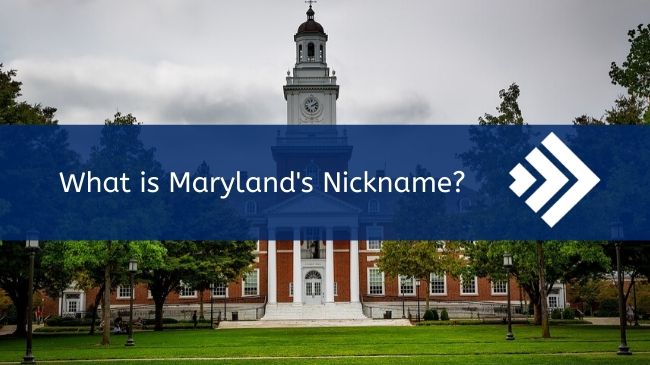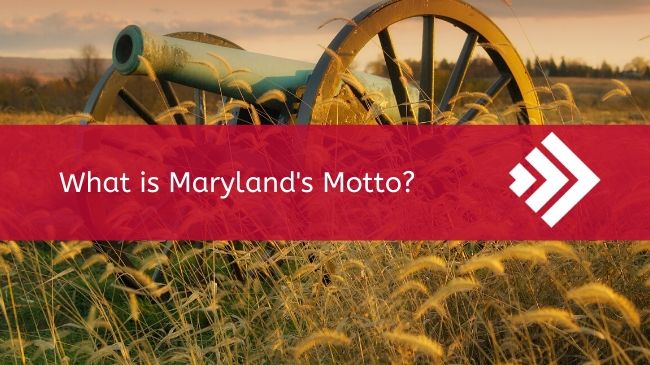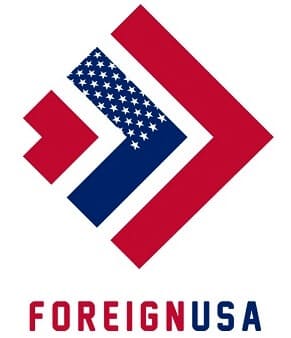Nicknames are common for people and sports teams, but why would a U.S. state have a nickname? The 50 States in the U.S. all have special and different qualities that they like to boast about, some of which are used to attract people to the state, whether to live there, or just for a visit, while others are rooted in long-standing history.
All these factors culminate into several interesting facts about Maryland, with one of the more notable ones being that the state GDP is around $374 billion!
Many states developed an initial nickname after they entered the union 100+ years ago, but not all state nicknames have stuck with each state over the years, and many have developed additional nicknames or primary nicknames that they identify with the most or that set them apart from other states. States take their nicknames from various sources so let’s take a look at Marylands nickname.

What is Maryland’s nickname? Old Line State.
The Old Line State is located in the Mid-Atlantic region of the US. Situated on the east coast of America, Maryland borders Washington, D.C., Virginia, Pennsylvania, Delaware, and West Virginia.
Maryland’s nickname originates from the revolutionary war, a war that spanned across an 8 year period, between 1775 and 1783. Maryland played an iconic role in this war and the escape of George Washington – this would subsequently result in the adoption of this famous nickname.
Maryland State Nickname
The revolutionary war, also known as “The American War of Independence” involved Britain and America and shaped the world we live in today. It was the birth of a brand new America, the United States of America.
The war was so iconic because not only did America win and declare their independence, they won because of the heart and never say die attitude displayed by the natives. Every county, village, town, and city, played a key role in the U.S. victory, subsequently leading to the nation’s independence.
The Maryland state nickname is derived from the huge part Maryland played in the war, when 400 soldiers in the First Maryland Regiment fought a British force of 10,000 men. This David vs Goliath battle would go down in history books all over the globe, not just the US. This battle helped General George Washington’s army escape from the chokehold of the British Empire.
It was General George Washington who bestowed the name “Old Line State” to Maryland, as a constant reminder of the Maryland Regiment, named the “Maryland Line”. The nickname pays homage to the 400 soldiers who courageously fought for their land and succeeded in the formation of the United States.
The Maryland state nickname isn’t the only nickname associated with Maryland, there is another official nickname, the “Free State”. The second Maryland state nickname was adopted on November 1, 1864, when the Maryland Constitution of 1864 came into effect.
This resulted in the abolition of slavery in Maryland, following this, Maryland became a free state! To celebrate this monumental achievement and shift in the history of Maryland and, in turn, the U.S., under the direction of the Baltimore City Council, five hundred guns were fired, bells were rung, and flags displayed.
What is Maryland’s Motto?

What is Maryland’s Motto? It is “Fatti maschii, parole femine”
Much the same as other states, Maryland has adopted a motto as well as the Maryland state nickname that represents the state and its people in a multitude of ways.
The motto, “Fatti maschii, parole femine” is an Italian phrase that translates to “Manly deeds, womanly words”, or in more different terms, “Strong deeds, gentle words”. The famous motto makes an appearance on the Maryland state seal.
The Maryland motto pays homage to the people of the state, past and present, and the way in which the people have had to battle through adversity, especially back in the revolutionary war. When all the odds were stacked against them, the people of Maryland successfully stuck together.
If you are interested in the Maryland state nickname and Maryland’s motto, chances are you will enjoy learning the Maryland state abbreviation – take a look at our page dedicated to this.


